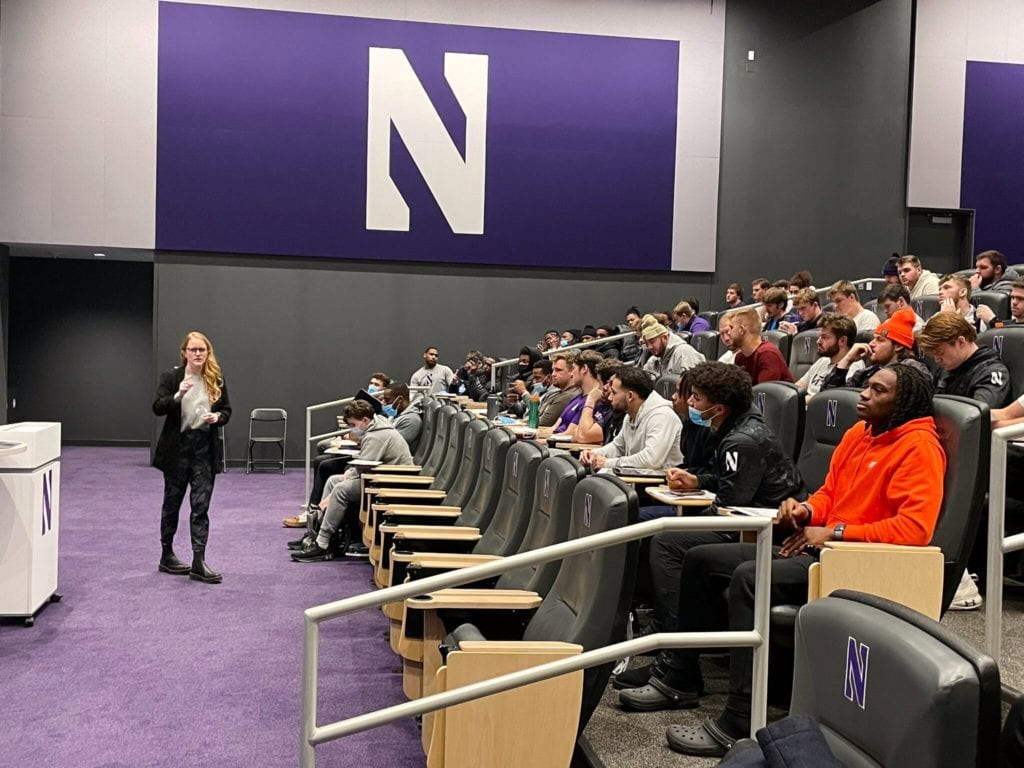To start, six schools will participate in the program as Altius looks to assist on all facets of NIL deals on campus.
Altius Sports is preparing for liftoff.
The NIL consultancy, led by CEO Casey Schwab, launched its GM program on Monday and expects to hire a minimum of five more people in the next two months.
The company is working to help schools establish NIL departments by creating a General Manager program. The first crop of schools participating are LSU, Cincinnati, Northwestern, Oklahoma State, South Carolina, and Virginia. The new initiative will place a trained Altius Sports representative at the center of all facets of NIL deals for a price tag dependent on the contract each university has with Altius Sports.
The representative that will be on campus will first begin helping the schools by educating them on the dos and don’ts of NIL. The next step is to identify, facilitate, and implement NIL deals. And once deals are completed, the rep will aid in marketing, branding, and content creation.

The GM program marks a major day for Schwab, the former vice president of business and legal affairs for NFL Players Inc., the marketing arm for the NFLPA. He left his post in 2020 shortly after the NFL and NFLPA agreed on a new collective bargaining agreement, leaving him with nothing but time on his hands. So he began taking phone calls from quite literally anyone in college sports that would talk to him about how they were going to approach the inevitable NIL era.
Schwab received one consistent answer from the litany of phone calls: We have absolutely no idea.
The lack of answers prompted Schwab to help the leaders of college sports find a resolution, and Altius Sports was born. Initially, Schwab said the company was receiving little-to-no money as it began with powerhouse schools LSU and Texas. That was two years ago. Now, Altius Sports has partnered with 28 schools. He would not say how much Altius Sports charges schools for its consultancy, but sources told Boardroom the price tag is between $120,000 to $150,000 per year.
As Schwab built partnerships, he also recruited a diverse and experienced staff. Bringing people to Altius from all walks of life didn’t happen by luck; Schwab wanted it.
“It’s vitally important to me as a person but it’s also good business,” Schwab told Boardroom. “It is proven that diversity of all respects, such as racial diversity, religious diversity and gender diversity is good business. For me it’s a no brainer. It is the right thing to do and it happens to be good for business.”
One of the many diverse candidates is Brittney Whiteside. Whiteside, Altius Sports’ vice president of collegiate partnerships, started in May. One of her main duties will be to lead the GM program. She’ll also get assistance from her colleague, Andrew Donovan, who is the executive vice president of collegiate partnerships.
“Schools and athletes are going to be surprised with the benefit of having someone there on the day-to-day,” Whiteside said. “What we found is that athletic departments really were not prepared for NIL and didn’t have the staff members that had the bandwidth to take on all the responsibilities associated with it. Fast forward to now, we are partnering with institutions and helping them create strategies and solutions with NIL.”
Whiteside is also a former Wright State women’s basketball player. Upon graduating, she gained experience in college athletic departments from schools like the Missouri, Appalachian State, and Virginia.
The structure of the GM program is similar to that of a brand consulting firm. There are executive vice presidents, vice presidents (one of which is Whiteside), two senior account executives, two account executives and coordinators. Each account executive has between five and 10 schools allocated to them. So far, they have one of the six GM positions filled. Altius is still hiring people for the GM program but hopes that one day they will have entire departments that will range from five to eight people working solely on NIL.
And although the program kicks off in the fall, Schwab told Boardroom that he is eager to jump into women’s sports.
“There are some folks who have brought up Title IX as a reason for schools not to get involved with NIL and I think that is the absolute wrong approach,” he said. “If you agree that institutional involvement, promotion, education, and advisement is going to protect all the athletes, including women, and it is going to promote athletes and their brands and get them more deals, then the answer to Title IX liability can’t be to not be involved because that hurts all the athletes, including women. The answer has to be getting involved and do it equitably.”
Altius Sports’ focus on women’s sports was vital to Olympic Gold and silver medalist Jessica Mendoza, who serves as one of the company’s advisors.
“What I found most important was Altius’ educational focus,” she said in an email. “That is the foundation, the only way to support all athletes, and the way forward. I have a particular focus on supporting female athletes, and that is a focus of Altius, so it really spoke to me. There are many different parts to the ecosystem but working with all stakeholders around making athletes the main priority, especially adding focus and attention to female athletes, is optimal.”

It Starts with Education
NIL misconceptions have run rampant over the past year. Twenty days into NIL, Alabama head coach Nick Saban claimed his quarterback Bryce Young had already hit “ungodly numbers” in earnings and said “it’s almost seven figures.” While the statement is likely true (most NIL earnings are not made public), it was also bait in the Crimson Tide’s water to lure high school recruits into the Alabama football talent pool.
10 months later, Texas A&M overtook Alabama for the top recruiting class in the country. At the time, Saban said “the issue and problem with NIL is coaches trying to create an advantage for themselves.” He later said the Aggies “bought every player on their team… we didn’t buy one player but I don’t know if we’re going to be able to sustain that in the future because more and more people are doing it.”
The comments sparked a feud between he and Texas A&M head coach Jimbo Fisher that has since cooled.
But Saban isn’t the only coach saying his school will lose recruits if his athletes are not able to garner NIL deals. Ohio State head football coach Ryan Day shared similar sentiments, saying he believes the Buckeyes need $13 million to keep their roster together.
Altius Sports is not partnered with any of the three above schools. And in its essence, the GM program is not designed to help college coaches build their roster as much as it is a tool to help athletes, coaches, and administrators learn as much as they can about NIL.
One of the reasons education is a tentpole of Altius Sports goes back to Schwab’s roots. Both his mother and his sister are teachers. The teaching base influenced him to become a professor at USC and adjunct professor at Howard University’s school of law.
“There is nothing I have enjoyed more in my career than teaching at those schools and this felt like an opportunity to teach,” he said. “Albeit in a different way, but getting in front of college athletes and teaching them about what it means to be their own CEO is fulfilling.”
Cincinnati is one of the schools that jumped at the opportunity to work with Altius.
“Trying to understand the space has been complicated,” Cincinnati athletic director John Cunningham told Boardroom. “The time it’s taken our staff to work on this and kind of pulling it away from their usual everyday work has been a challenge for everybody.”
Schwab is the one who initially reached out to Cunningham to gauge his interest in working with Altius. The two continued to have conversations and a partnership was born. When the GM program was built out, Cunningham felt like it was a viable solution that could help organize some of the complications.
The Bearcat football program is coming off one of the most successful seasons in its history. Two of Cincinnati’s key players, Desmond Ridder and Sauce Gardner, took completely different approaches to NIL. Ridder, a VaynerSports client, earned enough NIL money to rent a house. On the other hand, despite having a highly marketable nickname and stellar play on the field to match, Gardner was more focused on playing ball rather than gaining a horde of NIL deals.
But Whiteside said athletes won’t have to worry about managing their time well enough to earn money. That is because the program will present opportunities within their interests that the athletes will then have the power to approve or decline.
“We take them through the spectrum of opportunities and the time commitment that comes along with that and always let them know they have to make those decisions when it comes to time,” Whiteside said. “We continue to tell them the reason why they are here is because they are student-athletes and their responsibility is to do their job in the classroom and in their respective sport.”
Cunningham added: “The legal expertise that they have is going to be one people aren’t typically going to be able to find within an athletics department. Understanding where NIL is and seeing around the corner is important. Altius is a company that is going to be able to predict where this thing is going to go and get out in front of it.”
Both Cunningham and Northwestern athletic director Derrick Gragg said one of the struggles of figuring out NIL is manpower. A single NIL deal has the capability to touch the compliance office, a college player’s agent, and a head coach. And with no one having a designated job to focus solely on NIL, the web across departments can get tangled.
“The next frontier is hiring in-house staff and that’s something that we are really excited about,” Gragg said in a phone interview. “They have been able to steer us in the right direction in terms of where we need to go about our processes as we’ve moved along. They have done a good job of being out in the marketplace and analyzing a lot of the agreements and deals put together.”
The two athletic directors had their wishes granted earlier this week when they were selected for the GM program.

Scaling Up
The GM program marks the kickoff of a new stage for Altius Sports, but Schwab already has his sights set on the HBCU frontier.
“I am open for business to every single HBCU in the country to call me and we’ll figure it out,” he said. “It is important to me personally, given my teaching background and experience at Howard. We have been very intentional with our advisory group and senior leadership group of being diverse in all respects. There are too many people that look the same in sports generally and we’re trying to change that within not only ourselves but with our clients too.”
It isn’t just HBCUs. Schwab wants to scale Altius Sports across every inch of college sports.
“I want to be engaged with every single Power 5 school in some way, shape or fashion,” he said. “Whether it be the GM program or an external advisor or consultant, I want to be engaged with a significant portion of the non-Power 5 schools. There is a benefit for small Division I, Division II, and Division III schools having access to the resources that we have for their athletes.”